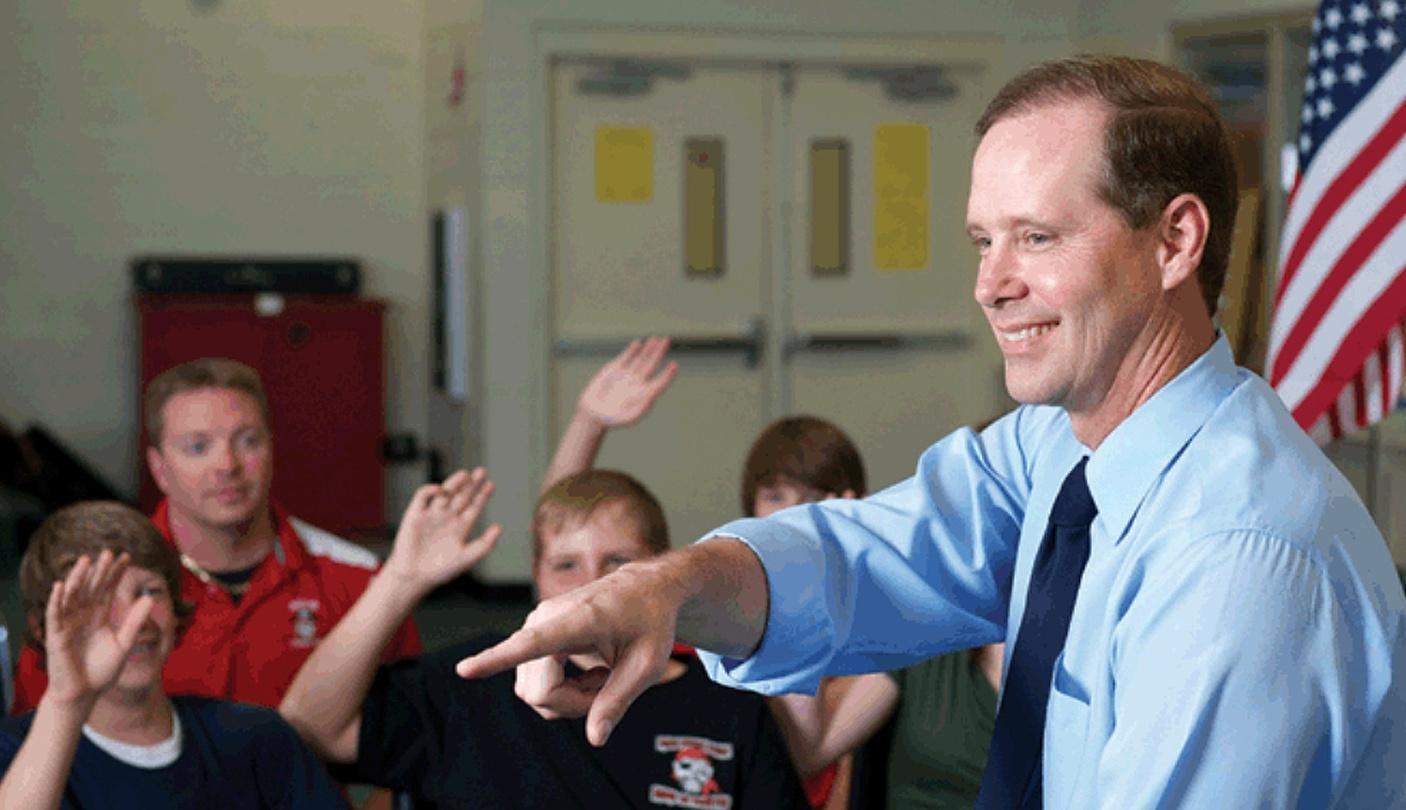But the election is also a referendum on the notion that Republicans need “new ideas.” After Democrats gleefully branded Republicans “the party of no new ideas,” House Minority Whip Eric Cantor launched a listening tour in April to drum up “fresh ideas” from regular people across America. Jeb Bush and Mitt Romney joined his call for original thinking. And RNC Chairman Michael Steele promised Tuesday that “the Republican Party is again going to emerge as the party of new ideas.” Rubio couldn’t have teed it up better himself. In 2006, Rubio wrote and published a book called 100 Innovative Ideas for Florida’s Future. It was the product of a yearlong campaign to get Floridians to submit their own ideas for government (and, of course, to elect Rubio). There were three criteria: The ideas had to be relevant to daily life, they had to focus on the future, and they could not “unnecessarily expand government.” The 1,500 submissions were whittled down to 100 concrete proposals, and the book became a template for his two-year tenure as speaker.
So here’s the question: With the Republican Party racking its brain for new ideas, could any of Rubio’s 100 proposals be the key to its resurgence?
Most of the 100 ideas deal with parochial issues that don’t really apply nationally. For example, one-third of the suggestions deal with education, pushing policies that reward good teachers, punish bad ones, and incentivize academic success (Nos. 1-33). Rubio also offers up the standard free-market fare: expand access to private health care (Nos. 86-89), require a supermajority vote to raise taxes (No. 94), and make it harder to file tort claims (No. 92). Then there are the expected law-and-order provisions, like limiting the time convicted felons have to appeal their sentences (No. 46) and keeping sex offenders locked up for life (No. 39).
Some ideas do stand out as novel. Rubio proposes free parking or reduced tolls for hybrid cars (No. 76). He wants the state government to have a highly fuel-efficient fleet of cars (No. 77). He proposes cutting tuition for students who pursue careers that are experiencing shortages, like math, science, nursing, engineering, and teaching (No. 26). (Jeb Bush tossed out this idea at the first meeting of Cantor’s National Council for a New America in Arlington, Va., earlier this month. Bush also blurbed Rubio’s book.)
In the book, Rubio shies away from social issues. There’s an emphasis on family—parental notification for social networking sites (No. 66), building “Children’s Zones” for at-risk kids (No. 69), creating a “family-friendly Hollywood” in Florida (No. 90)—but he doesn’t touch gay marriage or abortion. “The reason it’s not in the book is we didn’t hear a lot about it at that moment,” Rubio says. But, he tells me, he believes marriage is between a man and a woman. As for the federal marriage amendment, “I have mixed feelings about that.”
Rubio shares many goals of many liberals and moderates—better schools, safer streets, healthier children—but insists on market-based incentives to get there. Some of his proposals could even be part of an Obama platform, until you see the “how.” Other goals are classic supply-side economics, like his doomed quest against the property tax (No. 96). “That’s an example of an idea that didn’t work out the way we wanted,” he says.
The most relevant aspect of the book may be not its contents but its method. “It was as much a process as it is a product,” Rubio says. By asking for solutions rather than dictating them, “we were able to identify emerging issues before they made it into the newspapers or to the statehouse.”
Republicans seem to be getting the point. Cantor’s group is intended to solicit new ideas.
But the question is whether “new ideas” are what the party lacks or whether the problem is deeper. It could be the country’s shifting demographics—growing numbers of young people and Hispanics tend to support government solutions. Or maybe it’s just a matter of waiting for Obama to screw up.
The analytical frame of the moment describes a split between big-tent Republicans who would compromise and reach out to independents—particularly on social issues—and GOPers who would double down on conservative fundamentals. Rubio rejects that dichotomy. “I don’t think that’s how the debate is shaping up,” he says. “I think it’s between leadership and popularity. Between people who want principles, and people who think we should have focus groups and polls and make our policy based on that.”
It makes sense that Rubio would reject the big tent/small tent split, since it’s not clear which side he’d fall on. Yes, he’s more conservative than Charlie Crist. He’s pro-life, anti-stimulus, and anti-gay marriage. But he favors reaching out to independents as much as anyone. And as a Hispanic, he represents the GOP’s best hope to avoid losing an entire demographic the way it lost African-Americans.
In other words, the Crist-Rubio matchup is not a perfect test for whether the Republican Party should moderate. The lines are not clearly drawn. Sure, one is center-right and one is conservative. But the conservative belongs to a largely moderate/liberal demographic and has carved out a niche for himself as the ideas guy—two qualities that soil an otherwise pure litmus test.
Some say Rubio will hurt Republicans by bruising Crist. (Crist is still far ahead in the polls and won the coveted endorsement of the National Republican Senatorial Committee.) But that’s in the short term. In the long run, the GOP needs Rubio, both as a charismatic young conservative and as one of the party’s rising Hispanics. Putting his face out there will pay dividends in the future, even if it damages Crist now. Republicans might even hear a new idea or two.







